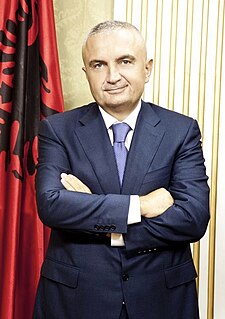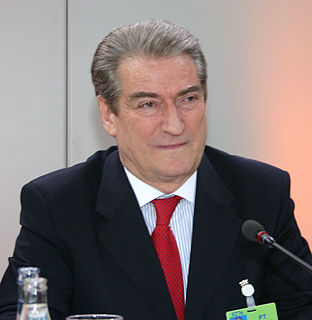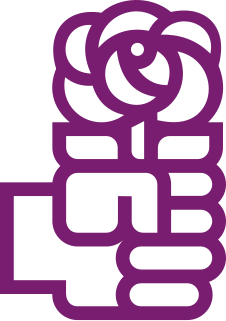
Sali Berisha (help·info), is an Albanian cardiologist and conservative politician who served as the second President of Albania from 1992 to 1997 and Prime Minister from 2005 to 2013. He was also the leader of the Democratic Party of Albania twice, from 1991 to 1992 and then again from 1997 to 2013. To date, Berisha is the longest-serving democratically elected leader and the only Prime Minister to serve two full terms since the end of Communism.

Edi Rama is an Albanian politician, artist, writer and former basketball player, who has been the 42nd Prime Minister of Albania and the Minister of Foreign Affairs since 2013 and January 2019, respectively. Rama has also been Chairman of the Socialist Party of Albania since 2005. Before his election as Prime Minister, Rama held a number of other positions. He was appointed Minister of Culture, Youth and Sports in 1998, a position that he held until 2000.
The New Democratic Party was a centre-right, conservative political party in Albania founded in 1999 as a split from the Democratic Party of Albania. It was led by Genc Pollo.

Ilir Meta is an Albanian diplomat and politician who has been serving as President of Albania since 24 July 2017. Previously he served as Prime Minister from 1999 to 2002, and at age 30 he is to date the youngest person to have been Prime Minister in Albanian history. Meta also served as Minister of Foreign Affairs from 2002 to 2003 and again from 2009 to 2010. He was Chairman of the Parliament of Albania from 2013 to 2017. Meta also held positions as Deputy Prime Minister and Minister of Economy, Trade, and Energy. Prior to that, he held the Chairmanship of the Parliamentary Commission of European Integration. Meta founded the Socialist Movement for Integration (LSI) in 2004.
Parliamentary elections were held in Albania on 3 July 2005. The result was a victory for the opposition Democratic Party (PD) and its allies, prominently the Republican Party (PR). Former president Sali Berisha became prime minister as a result of the election. Voter turnout was only 48.0%.

The Portuguese legislative election of 1985 took place on 6 October. In June of the same year, the former Prime-Minister, Mário Soares, had resigned from the job due to the lack of parliamentary support, the government was composed by a coalition of the two major parties, the center-right Social Democratic and the center-left Socialist, in what was called the Central Bloc, however this was an unstable balance of forces and several members of each party opposed such alliance.

Constitutional Assembly elections were held in the newly independent Republic of Montenegro on 10 September 2006. Prime Minister Milo Đukanović's Coalition for a European Montenegro, at whose core was the Democratic Party of Socialists, won 39 seats in the 81 seat parliament with the vote near fully counted. The opposition blocs together received 34 seats. There were 484,430 eligible voters.

Parliamentary elections were held in Serbia on 21 January 2007 to elect members of the National Assembly. The first session of the new National Assembly of the Republic of Serbia was held on 14 February 2007. The elections enabled the coalition of DS; DSS & G17+ to continue.

Parliamentary elections were held in Serbia on 11 May 2008 to elect members of the National Assembly. The election was held barely a year after the previous parliamentary election. There were 6,749,886 eligible electors who were able to vote in 8,682 voting places, as well as 157 special voting stations for refugees from Kosovo.
In 1991, the Socialist Party of Albania, with specific social democratic ideology took control of the country through democratic elections. One year later the Democratic Party of Albania won the new elections. After 1990, Albania has been seeking a closer relationship with the West. What followed were deliberate programs of economic and democratic reform, but Albanian inexperience with capitalism led to the proliferation of pyramid schemes – which were not banned due to the corruption of the government. Chaos in late 1996 to early 1997, as a result of the collapse of these pyramid schemes, alarmed the world and prompted the influx of international peacekeeping forces. In 1995, Albania was accepted into the Council of Europe and requested membership in NATO and is a potential candidate country for accession to the European Union. The workforce of Albania has continued to emigrate to Western countries, especially Greece and Italy.
Parliamentary elections were held in Albania on 24 June 2001. The result was a victory for the ruling Socialist Party of Albania, which won 73 of the 140 seats, resulting in Ilir Meta remaining Prime Minister. Voter turnout was 53.6%.

The 2011 Albanian opposition demonstrations were series of anti-government protests in cities around Albania following 18 months of political conflict over alleged electoral fraud by the opposition. A video surfaced which portrayed the vice-prime minister arranging a corrupt deal with the minister of economy. The public outcry over the video resulted in the resignation of the deputy prime minister. A demonstration was called by parliamentary opposition parties, which include the Socialist Party and the Unity for Human Rights Party. These were called on 21 January in order to protest the alleged corruption of the Albanian government as well as widespread unemployment and poverty in the country.

Parliamentary elections were held in Albania on 23 June 2013. The result was a victory for the Alliance for a European Albania led by the Socialist Party and its leader, Edi Rama. Incumbent Prime Minister Sali Berisha of the Democratic Party-led Alliance for Employment, Prosperity and Integration conceded defeat on 26 June, widely viewed as a sign of growing democratic maturity in Albania.
Albanian partial local elections of 2013 were held on September 1, 2013, and November 3, 2013. Following the Parliamentary Elections in June, and the new Albanian Government composition announced on July 31, 2013, there were reelections in four municipalities, three of them rural.
The elections were administrated by the Central Election Commission of Albania.

Klajda Gjosha is an Albanian politician, Minister of European Integration since September 2013 in the Edi Rama government.

Parliamentary elections were held in Albania on 25 June. They were first scheduled for 18 June, but after a possible boycott was announced by the opposition parties, during a large political crisis that lasted 3 months, an agreement was reached between all the political parties on 18 May to change the date. On 28 June, the central election council announced that Socialist party had won a majority.

The 2017 Albanian opposition protests were a series of anti-government protests, largely in Tirana, which centered around government corruption, the illicit drug situation in Albania, fear of electoral fraud in the parliamentary elections, and alleged manipulation of the voting process by the Socialist government.

The 2019 European Parliament election in Italy will be held on 26 May 2019, electing members of the 9th Italian delegation to the European Parliament as part of the European elections held across the European Union.

























